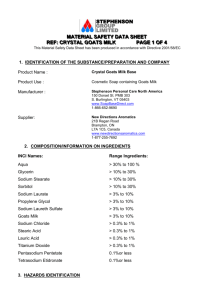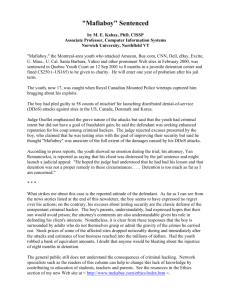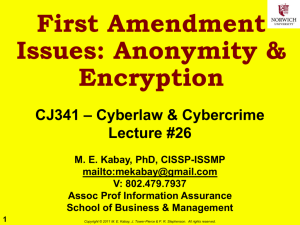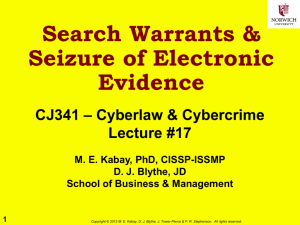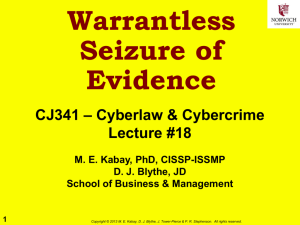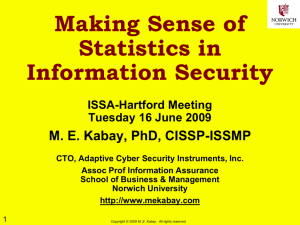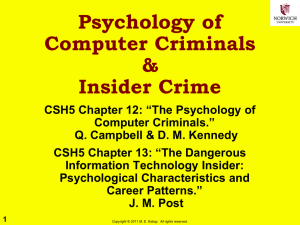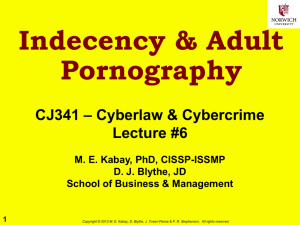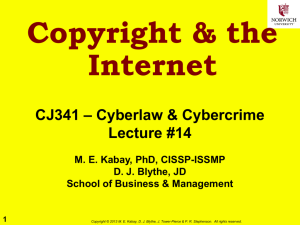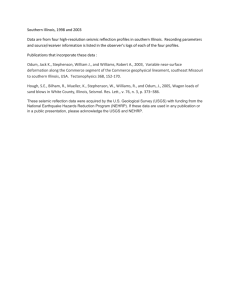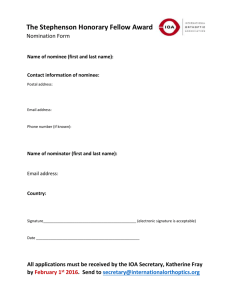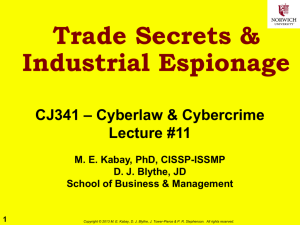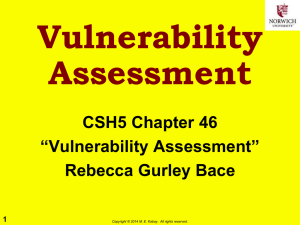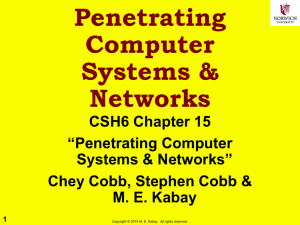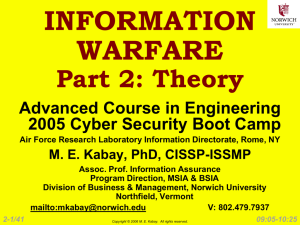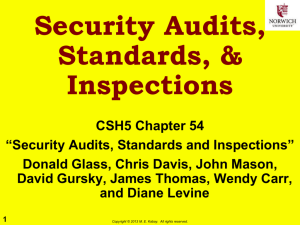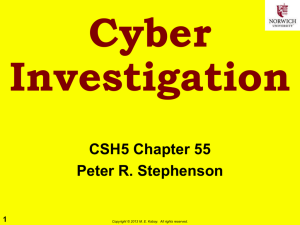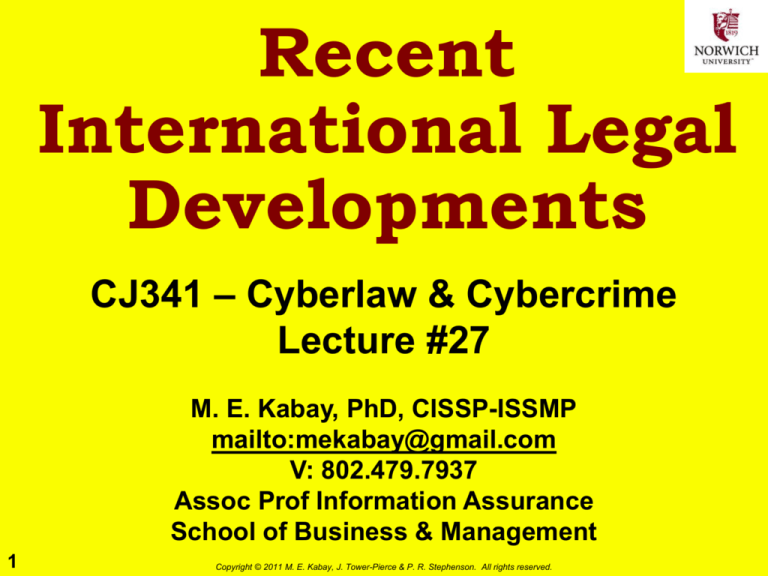
Recent
International Legal
Developments
CJ341 – Cyberlaw & Cybercrime
Lecture #27
M. E. Kabay, PhD, CISSP-ISSMP
mailto:mekabay@gmail.com
V: 802.479.7937
Assoc Prof Information Assurance
School of Business & Management
1
Copyright © 2011 M. E. Kabay, J. Tower-Pierce & P. R. Stephenson. All rights reserved.
Topics
Overview of International Issues
History
International Investigation & Enforcement
Challenges
Dual Criminality Doctrine
US Extraordinary Rendition
2
Copyright © 2011 M. E. Kabay, J. Tower-Pierce & P. R. Stephenson. All rights reserved.
International Issues
Jurisdictional Problems
Commission of offenses across territorial
borders
Investigation
Enforcement
What laws apply?
Who enforces them?
Defining computer crime
No international consensus on definition
3
Copyright © 2011 M. E. Kabay, J. Tower-Pierce & P. R. Stephenson. All rights reserved.
UN Study: Categories of
Cybercrime
Fraud by computer
manipulation
Computer-based forgery
Damage to or modifications of
computer data or programs
Unauthorized access to
computer systems and service
Unauthorized reproduction of
legally protected computer
programs
Child pornography (creation, trafficking. . .)
Use of computers by organized crime
Terrorist groups committing computer-related
crimes or other crimes
4
Copyright © 2011 M. E. Kabay, J. Tower-Pierce & P. R. Stephenson. All rights reserved.
Historical Overview
1977: US Senator introduced first cybercrime
legislation
Didn’t become law
Credited as the catalyst for international
policy
1983: Organisation for Economic Cooperation and Development (OECD)
Study of international legislation
Explored possibility of unified response
5
Copyright © 2011 M. E. Kabay, J. Tower-Pierce & P. R. Stephenson. All rights reserved.
History (cont’d)
1986: OECD published Computer-Related Crime
Report
Recommended a list of offenses
Envisioned list to be addressed by each UN
member country
1986-1989: Council of Europe (CoE) launched its
own study
To determine categories of
proposed offense conduct
To determine guidelines for
enacting criminal legislation
Issued recommendations
which expanded OECD list
6
Copyright © 2011 M. E. Kabay, J. Tower-Pierce & P. R. Stephenson. All rights reserved.
History (cont’d)
1995: CoE adopted recommendation
R(95)13
Identifies substantive offense
categories
Considers procedural issues
related to investigation &
evidence
E.g., search and seizure, cooperation obligations
Concern for civil rights (e.g.,
individual privacy)
European Privacy Directives
http://tinyurl.com/6ggqtm
require strict protections on
privacy
More severe than US laws
7
Copyright © 2011 M. E. Kabay, J. Tower-Pierce & P. R. Stephenson. All rights reserved.
History (cont’d)
1997: Committee of Experts on Cyberspace
appointed by CoE
Charged with identifying new crimes,
jurisdictional rights, and criminal liability
related to Internet
Canada, Japan, South Africa, and US invited to
participate
2001: Committee issued final report
Draft Convention on Cyber-Crime and Memo
Intended as blueprint for first international
treaty
http://conventions.coe.int/Treaty/EN/Treaties/Html/185.htm
8
Copyright © 2011 M. E. Kabay, J. Tower-Pierce & P. R. Stephenson. All rights reserved.
History (cont’d)
2001: Council of Europe, Convention on
Cybercrime
International Treaty adopted by Ministers of
Foreign Affairs
Signed by 26 member countries, including US
US President signed Convention on Nov. 23,
2001
2004: July 1st treaty took effect
2006: Up to 38 signatories
2006: Sept – US became party
2007: Jan 1: treaty took effect
9
Copyright © 2011 M. E. Kabay, J. Tower-Pierce & P. R. Stephenson. All rights reserved.
International Investigation &
Enforcement Challenges
Responsiveness (speed) of International Community
“Heel dragging” (Clifford)
by governments
Technology-Law lag: laws
can’t keep pace
Complexity of international
legal landscape
Jurisdiction and venue
(where to try) issues
Need for domestic legislation
Lack of global consensus on
Definition of cybercrime
Types of conduct that make up cybercrimes
Definition of criminal conduct (i.e., what conduct
should be criminalized)
10
Copyright © 2011 M. E. Kabay, J. Tower-Pierce & P. R. Stephenson. All rights reserved.
International Investigation &
Enforcement Challenges (cont’d)
Transnational scope of many crimes
Lack of procedural law uniformity
Lack of synchronicity of legal mechanisms
E.g., extradition and mutual legal
assistance treaties
Inadequate investigatory powers and access
to computer systems
Lack of and/or inconsistent training of LE and
criminal justice actors
Lack of resources ($)
11
Copyright © 2011 M. E. Kabay, J. Tower-Pierce & P. R. Stephenson. All rights reserved.
Resolution of Challenges
Resolution of investigation &
enforcement challenges
critical
International cooperation is
limited to countries with
domestic laws and/or to
treaty signatories
EC began discussions in
2000 on special international
school for LE
Focus on cybercrime
Involve Interpol
12
Copyright © 2011 M. E. Kabay, J. Tower-Pierce & P. R. Stephenson. All rights reserved.
Interpol
International Criminal Police Organization
History
Founded Vienna 1923;
reconstituted 1946
Nonpolitical
Funded by member contributions
General assembly: annual meeting
Decide policy
Elect officials
HQ in Lyon, France
Functions
Coordinate international police work
Organize regular information exchange
http://www.interpol.int/public/icpo/default.asp
13
Copyright © 2011 M. E. Kabay, J. Tower-Pierce & P. R. Stephenson. All rights reserved.
Interpol (cont’d)
Priority crime areas
Public safety and terrorism
Drugs and criminal organizations
Trafficking in human beings
Financial and high-tech crime
Fugitives
Other crime areas
Counterfeit currency and payment cards
Environmental crime
Genocide, war crimes, crimes against humanity
Criminal analysis service
14
Interpol Annual Report for 2005:
http://www.interpol.int/Public/ICPO/InterpolAtWork/iaw2005.pdf
Copyright © 2011 M. E. Kabay, J. Tower-Pierce & P. R. Stephenson. All rights reserved.
Council of Europe Convention
on Cybercrime Treaty
Only multilateral treaty dealing with computerrelated crime and evidence
Took effect July 1, 2004
38 Countries have signed
Few have ratified it
US became party in late September 2006
Obligations imposed on participating nations:
Enact legislation criminalizing certain
computer-related conduct
Create investigative procedures
Create a regime of broad international
cooperation (e.g., co-operation in extradition)
15
Copyright © 2011 M. E. Kabay, J. Tower-Pierce & P. R. Stephenson. All rights reserved.
Key Treaty Provisions
Consists of 48 articles, divided into 4 chapters
Chapter II, Section 1
Substantive law issues
Defines 9 offenses grouped into 4 categories
Illegal access
Illegal interception
Data interference
System interference
Misuse of devices
Computer-related forgery
Computer-related fraud
Child pornography related offenses
Copyright related offenses
16
Copyright © 2011 M. E. Kabay, J. Tower-Pierce & P. R. Stephenson. All rights reserved.
Key Treaty Provisions Cont.
Chapter II, Section 2.
Addresses procedural law issues
Preservation of stored data
Interception of content data
Disclosure of traffic data
Search & Seizure
Chapter II, Section 3.
Jurisdictional Provisions
Chapter III.
Mutual assistance obligations
E.g., extradition rules
17
Copyright © 2011 M. E. Kabay, J. Tower-Pierce & P. R. Stephenson. All rights reserved.
Key Treaty Definitions
Treaty defines 4 principle terms
Computer systems
Computer data
Service provider
Traffic Data
Members not required to incorporate
definitions into domestic laws
18
Copyright © 2011 M. E. Kabay, J. Tower-Pierce & P. R. Stephenson. All rights reserved.
Treaty Evidence Collection
Provides four methods for securing evidence
Article 18: Production Order
Legal authority must exist to order production
of data (e.g., authority to order an ISP to
produce subscriber info)
Article 19: Search & Seizure of Stored Data
Applies to stored computer data
Limitation
Doesn’t address trans-border search and
seizure (searching without first going
through mutual assistance channels)
Article 20: Real time collection of traffic data
Article 21: Interception of Collection Data
19
Copyright © 2011 M. E. Kabay, J. Tower-Pierce & P. R. Stephenson. All rights reserved.
Crimes
Section 1, Articles 2-13 establish minimum standards of
offenses
Requires all offenses be committed intentionally (mens rea)
Offenses include
Title 1, Articles 2-6: Offenses against confidentiality,
integrity, and availability of data and systems
Title 2, Articles 7-8: Offenses related to forgery and
fraud
Title 3, Article 9: Offenses related to Child Pornography
Title 4, Article 10: Offenses related to copyright
infringements
Title 5, Articles 10-13: Aiding, Abetting, Corporate
Liability provisions
20
Copyright © 2011 M. E. Kabay, J. Tower-Pierce & P. R. Stephenson. All rights reserved.
Jurisdiction
Article 22: attempts to resolve jurisdiction question
Territoriality principle
Prosecute where committed
Ubiquity doctrine
Crime committed in its entirety within a
country’s jurisdiction if one of the elements of
the offense or result occurred in that country’s
borders
Jurisdiction also applies to co-defendants &
accomplices
Principle of nationality
Provides nationals are required to abide by a
party’s domestic laws even when they are
outside the country
21
Copyright © 2011 M. E. Kabay, J. Tower-Pierce & P. R. Stephenson. All rights reserved.
Mutual Legal Assistance
Treaties & Other Agreements
Mutual Legal Assistance Treaties (MLATs)
Aimed to improve judicial assistance and facilitate
procedures with foreign nations
Usually spell out agreed upon procedures
Only for prosecutors
E.g., Office of International Affairs, Criminal
Division of DOJ
Dual Criminality
Meaning conduct is equivalent offense in both
countries involved in extradition negotiations
Many MLATs require dual criminality
Investigation can’t proceed if target nation hasn’t
criminalized conduct
22
Copyright © 2011 M. E. Kabay, J. Tower-Pierce & P. R. Stephenson. All rights reserved.
Dual Criminality Doctrine
Extradition requires
Collaboration of LE agencies across borders
Consistent classification of crimes
Both must define the crime
E.g., Philippines did not define Love Bug
distribution as a crime despite massive worldwide
damage
If a crime, must match in severity across borders
Thus cannot extradite if extraditing country treats
crime as more serious (e.g., felony) than complying
country (e.g., misdemeanor)
E.g., US in a minority in North America, South
America and Europe in maintaining death penalty
Blocks extradition of some suspects
23
Copyright © 2011 M. E. Kabay, J. Tower-Pierce & P. R. Stephenson. All rights reserved.
US Extraordinary Rendition
Controversial process
CIA capturing suspects outside boundaries of
United States
Without legal processes for extradition
Sending them for interrogation
to countries with looser or no
restrictions on torture
Egypt
Jordan
Morocco
Syria
Uzbekistan
http://www.pbs.org/frontlineworld/stories/rendition701/
24
Copyright © 2011 M. E. Kabay, J. Tower-Pierce & P. R. Stephenson. All rights reserved.
US Extraordinary Rendition [2]
Defenders
E.g., CIA Director GEN Michael V. Hayden
Speaking at Council on Foreign
Relations
2007-09-07
Carefully controlled and lawfully
conducted
Nothing new
Total numbers in dozens
Used to combat terrorists around world
Intelligence produced irreplaceable and has worked to
deter attacks
Constitutional limitations inadequate for current situation
https://www.cia.gov/news-information/speeches-testimony/2007/general-haydensremarks-at-the-council-on-foreign-relations.html
http://tinyurl.com/5rubaw
25
Copyright © 2011 M. E. Kabay, J. Tower-Pierce & P. R.or
Stephenson.
All rights reserved.
US Extraordinary Rendition [3]
http://www.aclu.org/safefree/torture/rendition.html
Attackers
http://www.fpif.org/fpiftxt/5502
E.g., ACLU
Foreign Policy in Focus of Institute for Policy Studies
Process inherently subject to error
Arbitrary arrest, kidnapping
No challenge to allegations
Documented cases of abuse (see following)
Violation of international conventions & US law against
torture
Ineffective in extracting usable intelligence
Documented failure of torture to extract truth
Victim will agree to anything to reduce pain
Reduces protection of US personnel against torture around
world
Cannot claim US gov’t compliance with UN Convention
26
Copyright © 2011 M. E. Kabay, J. Tower-Pierce & P. R. Stephenson. All rights reserved.
US Extraordinary Rendition [4]
Khaled El-Masri
Innocent German citizen from Ulm on
vacation in Skopje in 2003
Detained by Macedonian border guard
Mistaken identity: thought he was
Khalid Al-Masri of Al Qaeda in Hamburg
Turned over to CIA
Beaten, stripped, drugged, given enema, dressed in
diaper & jumpsuit, flown to Baghdad
Flown to Afghanistan and imprisoned in secret CIO
interrogation center
Tortured repeatedly, beaten, raped, force-fed
March 2004: captors admitted he was innocent
Released May 2004 without money on deserted road in
Albania
27
http://www.guardian.co.uk/world/2005/jan/14/usa.germany
Copyright © 2011 M. E. Kabay, J. Tower-Pierce & P. R. Stephenson. All rights reserved.
US Extraordinary Rendition [5]
Maher Arar
Canadian/Syrian dual citizen
Sep 2002: Detained at JFK Airport on
way home to Canada from holiday in
Tunis
Solitary confinement in US under
interrogation without lawyer
Deported to Syria & tortured for year
Syrian gov’t found no links to terrorism
Canadian gov’t commission of enquiry
cleared Arar of all accusations
Gave him $10.5M compensation
Lawsuit in progress (Arar v. Ashcroft)
US gov’t keeps Arar and family on watchlist
Allowed gov’t to use claim of national security to refuse
evidence to court – case dismissed 2009
28
http://jurist.law.pitt.edu/forumy/2006/09/arar-report-us-should-follow-canadas.php
http://www.maherarar.ca/
http://ccrjustice.org/ourcases/current-cases/arar-v.-ashcroft
Copyright © 2011 M. E. Kabay, J. Tower-Pierce & P. R. Stephenson. All rights reserved.
Maher Arar case on
Democracy Now
Democracy Now October 19, 2006
http://video.google.com/videoplay?docid=7174998579366061294# (streaming video)
http://www.mekabay.com/courses/academic/norwich
/cj341/lectures/27_ghost_plane.mp3 (audio
download)
Democracy Now November 3, 2009
– starting 14’56” to 25’25”
http://i2.democracynow.org/shows/2009/11/3
(streaming video)
http://www.mekabay.com/courses/academic/norwich
/cj341/lectures/27_maher_2009.mp3 (audio
download)
29
Copyright © 2011 M. E. Kabay, J. Tower-Pierce & P. R. Stephenson. All rights reserved.
DISCUSSION
30
Copyright © 2011 M. E. Kabay, J. Tower-Pierce & P. R. Stephenson. All rights reserved.

